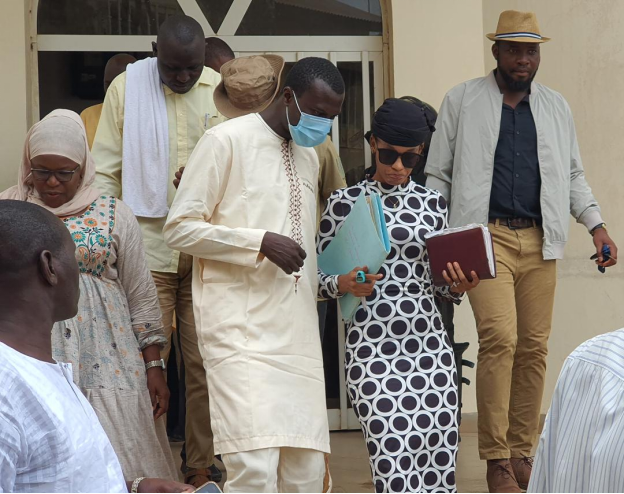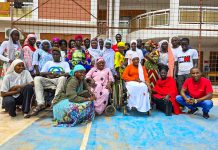By Kemeseng Sanneh (Kexx)
The case against Yanks Dabo resumed at the Banjul Magistrate’s Court. Yesterday’s proceedings primarily focused on the ruling on the defence motion, which sought two actions: firstly, for the presiding magistrate to recuse himself from the case, and secondly, to stay the proceedings pending an appeal at the High Court.
Magistrate Thomasi has declined to recuse himself from the case. The Magistrate indicated in his ruling that recusal is not automatic but at the discretion of the Chief Justice.
The Magistrate has granted a stay of proceedings on the second issue raised by the defence’s motion. He ruled that the proceedings of the case would be halted until a decision on the appeal made to the High Court was reached.
He emphasised that decision to recuse a Judge/magistrate lies with the Chief Justice, as clarified in the unreported case of R.Y. vs. Justice Udama. He said Chief Justice Hassan B. Jallow ruled that an application for recusal is not automatic and requires specific circumstances for consideration. Thus, the Magistrate could only be recused upon the direction of the Chief Justice.
“Having stated that a stay of proceedings is granted, the outcome/decision of the applicant court will determine the continuity of the matter or otherwise. Be that as it may, shall it appeal succeed, prayer one in its said motion will be of no effect or use.
Therefore prayer (1) is denied as it is not granted.
“Furthermore, the recusal of the sitting magistrate will only be borne upon its directive of the chief justice as in the unreported case of R.Y Mendy vs Justice Udoma,” Magistrate argued.
The ruling was premised upon the motion dated and filed on the 6th day of September 2023 by counsel for the accused/applicant in which the prayer sought are-
1. For an order recusing oneself from taking any further steps in the hearing and determination of the charge(s) filed against accused/applicant Yankuba Darboe in the court and/or in the alternative.
2. For an order staying the hearing and determination of the charges preferred/proffered against the accused/applicant pending hearing and determination of the appeal at the high court.
The defence led by Counsel Camara informed the court that they had filed a motion on notice on September 6th, 2023, and he expressed his intention to move the motion. The prosecution acknowledged the receipt of the motion and stated that they have no objection to the defence moving the motion.
Counsel L.S. Camara, in moving the motion presented the details of the Affidavit in support of the motion explaining that the motion is a 31-paragraph affidavit sworn to by Yankuba Darboe. He emphasized the importance of paragraphs 1 to 10, which provided the background and timeline of the case back in 2021. He said paragraphs 12 to 31 outlined the process of the court ruling, which was delivered on August 17th, 2023, and subsequently appealed on August 28th, 2023.
Counsel Camara argued that the ruling on August 17th had overreached on several occasions, affecting the substance of their defence. He contended that a fair hearing, as guaranteed by section 24 of the Constitution, necessitates the accused party being heard before any determination is made.
Counsel Camara referred the count to paragraphs 16 to 23 of the affidavit, which expressed their discomfort with the presiding magistrate’s ruling on the no-case submission of the case.
Camara said the court considered or made a ruling on contempt of court charges (which were not before the court), and pre-determined the case’s outcome without hearing their defence.
The affidavit in support of the motion sworn by Yankuba Darboe himself asserts that he (Yankuba) was charged with two counts of seditious offences and one count of using abusive language in public.
It is stated that the court delivered its ruling on the no case to answer submission on August 17, 2023, and Darboe expressed dissatisfaction with the ruling. He claims that the court has already decided on the entire trial in the ruling and has considered extraneous matters not presented as evidence. Darboe argued that the court has predetermined the outcome of the case without hearing his defence, rendering his defence futile and academic.
In light of these, Darboe seeks the recusal of the magistrate from further involvement in the case, asserting that the court cannot be seen as impartial anymore. He also states that the ruling on the no case to answer submission amounts to a final judgment in the matter.
The grounds of Appeal indicate seven grounds of Appeal in which the appellant, Yankuba Darboe, is dissatisfied with the ruling of the Magistrate Court at Banjul, delivered by Magistrate M.L. Thomasi on the 17th of August 2023.
The appeal filed by the defence indicates seven specific arguments against the ruling of the Magistrate Court. These include errors in law and fact, such as the court basing the “no case to answer” submission solely on the charge of sedition, overlooking the fact that it was not required to analyze the evidence at that stage, considering extraneous matters not supported by evidence, and holding that the burden was shifted to the appellant to open his defence. The defence seeks an order from the High Court of the Gambia to quash the ruling in its entirety.
In response, the prosecution stated that they would not file an affidavit in opposition to the motion as they are not directly related to the prosecution’s case. Commissioner Sanneh argued that the motion, which requested the rescue and stay of proceedings, is a matter for the Judiciary to decide and did not have a significant impact on their position (prosecution)
The presiding magistrate indicated that the court had adopted the motion and the arguments of both parties and set the ruling on September 25th at 11:30 which was delivered.
“It is categorical that a bird’s eyes view of paragraphs 1-10 of the 31-paragraph affidavit in 15 is in contradiction with the evidence before the court as it is stated that there was an analysis of the prosecution’s evidence,” Magistrate Thomasi said.
Magistrate Thomasi said the outcome of the decisions of the High Court will decide whether the matter will continue to proceed at the Magistrate court or not.




















